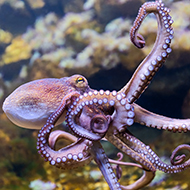BVA welcomes recognition of cephalopods and decapods as sentient

"These changes are a resounding win for animal welfare" - Justine Shotton, BVA president.
The British Veterinary Association (BVA) welcomes the Government's recognition of cephalopods and decapods as sentient beings, as the scope of the Animal Welfare (Sentience) Bill has been expanded to included cephalopod molluscs and decapod crustaceans.
Announced on Friday 19 November, the changes will see cephalopods, including octopuses, squid and cuttlefish, and decapods, including crabs, lobsters and crayfish, recognised as capable of feeling emotions such as pain and distress. This recognition will protect these creatures under the new sentience laws.
BVA president Justine Shotton commented on the importance of this decision in a press release: “We’re really heartened by today’s move, which will place a duty on the state to consider the sentience of decapod and cephalopods within all future policy making as well as vertebrate animals.
“BVA and others have long championed crustacean and molluscs as having the capacity to experience feelings such as pleasure and pain, and the growing scientific evidence base really served to strengthen this argument.
“These changes are a resounding win for animal welfare which will provide new gold standard protections to millions of crustaceans as well as other species.”
Lord Zac Goldsmith, Animal Welfare Minister, said of the changes to the Animal Welfare (Sentience) Bill: “The Animal Welfare Sentience Bill provides a crucial assurance that animal wellbeing is rightly considered when developing new laws.
“The science is now clear that decapods and cephalopods can feel pain and therefore it is only right they are covered by this vital piece of legislation.”



 RCVS Knowledge has welcomed Professor Peter Cockcroft as editor-in-chief for Veterinary Evidence.
RCVS Knowledge has welcomed Professor Peter Cockcroft as editor-in-chief for Veterinary Evidence.